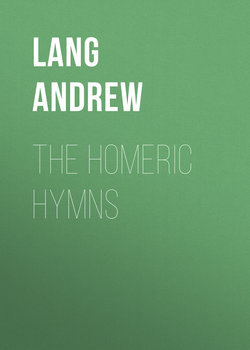The Homeric Hymns

Реклама. ООО «ЛитРес», ИНН: 7719571260.
Оглавление
Lang Andrew. The Homeric Hymns
PREFACE
ESSAYS INTRODUCTORY
THE SO-CALLED HOMERIC HYMNS
THE HYMN TO APOLLO
THE HYMN TO HERMES
THE HYMN TO APHRODITE
THE HYMN TO DEMETER
HYMN TO DEMETER
THE ALLEGED EGYPTIAN ORIGINS
CONCLUSION
HOMERIC HYMNS
HYMN TO APOLLO
THE FOUNDING OF DELPHI
II. HERMES
III. APHRODITE
IV. HYMN TO DEMETER
V. TO APHRODITÉ
VI. TO DIONYSUS
VII. TO ARES
VIII. TO ARTEMIS
IX. TO APHRODITE
X. TO ATHENE
XI. TO HERA
XII. TO DEMETER
XIII. TO THE MOTHER OF THE GODS
XIV. TO HERACLES THE LION-HEART
XV. TO ASCLEPIUS
XVI. TO THE DIOSCOURI
XVII. TO HERMES
XVIII. TO PAN
XIX. TO HEPHÆSTUS
XX. TO APOLLO
XXI. TO POSEIDON
XXII. TO HIGHEST ZEUS
XXIII. TO HESTIA
XXIV. TO THE MUSES AND APOLLO
XXV. TO DIONYSUS
XXVI. TO ARTEMIS
XXVII. TO ATHENE
XXVIII. TO HESTIA
XXIX. TO EARTH, THE MOTHER OF ALL
XXX. TO HELIOS
XXXI. TO THE MOON
XXXII. TO THE DIOSCOURI
XXXIII. TO DIONYSUS
Отрывок из книги
“The existing collection of the Hymns is of unknown editorship, unknown date, and unknown purpose,” says Baumeister. Why any man should have collected the little preludes of five or six lines in length, and of purely conventional character, while he did not copy out the longer poems to which they probably served as preludes, is a mystery. The celebrated Wolf, who opened the path which leads modern Homerologists to such an extraordinary number of divergent theories, thought rightly that the great Alexandrian critics before the Christian Era, did not recognise the Hymns as “Homeric.” They did not employ the Hymns as illustrations of Homeric problems; though it is certain that they knew the Hymns, for one collection did exist in the third century B.C. 1 Diodorus and Pausanias, later, also cite “the poet in the Hymns,” “Homer in the Hymns”; and the pseudo-Herodotus ascribes the Hymns to Homer in his Life of that author. Thucydides, in the Periclean age, regards Homer as the blind Chian minstrel who composed the Hymn to the Delian Apollo: a good proof of the relative antiquity of that piece, but not evidence, of course, that our whole collection was then regarded as Homeric. Baumeister agrees with Wolf that the brief Hymns were recited by rhapsodists as preludes to the recitation of Homeric or other cantos. Thus, in Hymn xxxi. 18, the poet says that he is going on to chant “the renowns of men half divine.” Other preludes end with a prayer to the God for luck in the competition of reciters.
To the English reader familiar with the Iliad and Odyssey the Hymns must appear disappointing, if he come to them with an expectation of discovering merits like those of the immortal epics. He will not find that they stand to the Iliad as Milton’s “Ode to the Nativity” stands to “Paradise Lost.” There is in the Hymns, in fact, no scope for the epic knowledge of human nature in every mood and aspect. We are not so much interested in the Homeric Gods as in the Homeric mortals, yet the Hymns are chiefly concerned not with men, but with Gods and their mythical adventures. However, the interest of the Hymn to Demeter is perfectly human, for the Goddess is in sorrow, and is mingling with men. The Hymn to Aphrodite, too, is Homeric in its grace, and charm, and divine sense of human limitations, of old age that comes on the fairest, as Tithonus and Anchises; of death and disease that wait for all. The life of the Gods is one long holiday; the end of our holiday is always near at hand. The Hymn to Dionysus, representing him as a youth in the fulness of beauty, is of a charm which was not attainable, while early art represented the God as a mature man; but literary art, in the Homeric age, was in advance of sculpture and painting. The chief merit of the Delian Hymn is in the concluding description of the assembled Ionians, happy seafarers like the Phæacians in the morning of the world. The confusions of the Pythian Hymn to Apollo make it less agreeable; and the humour of the Hymn to Hermes is archaic. All those pieces, however, have delightfully fresh descriptions of sea and land, of shadowy dells, flowering meadows, dusky, fragrant caves; of the mountain glades where the wild beasts fawn in the train of the winsome Goddess; and the high still peaks where Pan wanders among the nymphs, and the glens where Artemis drives the deer, and the spacious halls and airy palaces of the Immortals. The Hymns are fragments of the work of a school which had a great Master and great traditions: they also illustrate many aspects of Greek religion.
.....
According to that criterion, I think we probably have in the Hymn the work of a good poet, in the early part; and in the latter part, or second Hymn, the work of a bad poet, selecting unmanageable passages of myth, and handling them pedantically and ill. At all events we have here work visibly third rate, which cannot be said, in my poor opinion, about the immense mass of the Iliad and Odyssey. The great Alexandrian critics did not use the Hymns as illustrative material in their discussion of Homer. Their instinct was correct, and we must not start the consideration of the Homeric question from these much neglected pieces. We must not study obscurum per obscurius. The genius of the Epic soars high above such myths as those about Pytho, Typhaon, and the Apollo who is alternately a dolphin and a meteor: soars high above pedantry and bad etymology. In the Epics we breathe a purer air.
Descending, as it did, from the mythology of savages, the mythic store of Greece was rich in legends such as we find among the lowest races. Homer usually ignores them: Hesiod and the authors of the Hymns are less noble in their selections.
.....